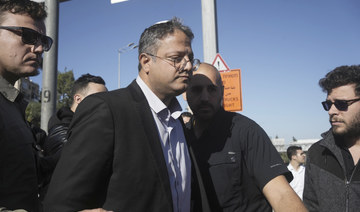RAMALLAH: Palestinians are ready to confront the policies and actions of the Israeli occupation forces with widespread displays of resistance and steadfastness, Prime Minister Mohammed Shtayyeh said on Monday.
His comments, at the start of a cabinet session on Monday in Ramallah, came amid growing Palestinian alarm over a key role promised to far-right politician Itamar Ben-Gvir in the next Israeli government. Ben-Gvir, a settler living in the West Bank who has long been a fierce opponent of Palestinian statehood, will reportedly have an expanded national security portfolio in the new administration, including responsibility for border police in the West Bank.
More generally, concerns are growing by the day among Palestinians about the likely threats posed by the extreme right-wing Israeli coalition government being formed under the leadership of Likud leader Netanyahu, which will include members of radical religious parties.
Prominent extremist leaders such as Ben-Gvir and Bezalel Smotrich have openly stated the policies they intend to impose on Palestinians upon the formation of a government in which they are involved.
As a sign of the growing threat, their supporters among the settler population in the West Bank, and some Israeli army soldiers, reportedly have already begun to display more aggressive behavior toward Palestinian civilians.
Israeli sources said one of the plans of the Netanyahu government will be to legalize 60 settler outposts in the West Bank, built by Hilltop Youth extremists on large areas of confiscated Palestinian land. There are said to be plans to allocate money for the modernization and development of the outposts, and to expand the powers of the Israeli Civil Administration to approve the allocation of land for settlement expansion, according to the sources. The new Israeli government will allocate about $52 million annually for development of infrastructure for the “new small settlements” and outposts, they said.
On Monday, Shtayyeh said that the intentions of the next Israeli government had started to become clear, along with its “aggressive and colonial programs and its plans to erase the 1967 borders and to strengthen colonial outposts and turn them into new colonies, and provide them with what they need, covering it legally, materially and politically.”
He said the aggression continues despite “our realization that all settlements are illegal and illegitimate according to international law.”
Shtayyeh added that the next Israeli government will form settler militias, under the protection of the Israeli army, and had vowed to further escalate an already tense situation. However, the threats and intimidation will not frighten the Palestinians, he said.
The administration of US President Joe Biden has stated its opposition to settlement expansion in the West Bank on the grounds that it threatens the two-state solution that Washington supports.
The Palestinians fear continuing settlement expansions will destroy their dream, for which they have fought for 55 years, of a contiguous Palestinian state on the Palestinian lands occupied by Israel in 1967, with East Jerusalem as its capital.
Khalil Al-Tafakji, director of the maps department and an expert on settlement affairs at the Arab Studies Society in Jerusalem, told Arab News that Ben-Gvir is a settler from the Kiryat Arba settlement near Hebron who ideologically considers the West Bank to be part of Israel. He will not accept that there is any state other than Israel between the Jordan River and the Mediterranean Sea and does not believe in the existence of a Palestinian state.
Israeli political and religious parties on the left and right and in the center have differing opinions on many matters, Al-Tafakji said, but they all agree on the issue of settlements and opposition to the establishment of a Palestinian state.
“The legalization of settlement outposts in the West Bank will make these outposts a national priority in terms of allocating funds to them, paving roads linking them to neighboring settlements and main streets, exempting them from taxes, and transforming them in the future to be part of a large settlement close to them,” he said.
Al-Tafakji said that what concerns him most is that because a significant part of the new government is likely to include extreme right-wing politicians such as Ben-Gvir and Smotrich, who hail from settlement backgrounds, Netanyahu might appear more moderate.
There are 145 settlements in the West Bank, in which about 550,000 settlers live, 15 settlements in East Jerusalem that are home 230,000 settlers, and 170 illegal outposts. All settlements in the West Bank are illegal under international law. Most of the settlement outposts are in the Jordan Valley or the Hebron area in the southern West Bank, Al-Tafakji said, and they represent a clear existential threat to the Palestinian dream of a state of their own
Younes Arar, director of international relations at the Settlement and Wall Resistance Commission, told Arab News that the growing threat of legalization of settlement outposts comes amid an increase in the pace of demolitions of Palestinian homes in the West Bank in recent days. This is in addition to moves to return settlers to outposts previously vacated by an Israeli political decision, including Avitar, south of Nablus, and Tarslah, near Jenin, he said.
Benny Gantz, who was defense minister in the previous coalition government, strongly criticized the plans to place Ben-Gvir in control of the Border Guard as part of the coalition agreement with Netanyahu.
Gantz, who has accused Ben-Gvir of establishing a private militia, warned against the politicization of the army. There is a consensus among the public on this issue, he told Channel 12 news on Monday.
“I am confident that the leaders and the Israeli army will not acquiesce in the illegal demands in the army,” he said.
Gantz also criticized a reported agreement to transfer the oversight unit in the Israeli Civil Administration that handles civilian and humanitarian affairs of the Palestinians in the West Bank and Gaza Strip to Smotrich, leader of the Religious Zionist Party.
Meanwhile, Israel has announced that it will now be an offense punishable by three years in prison for Arab-Israelis or Israelis to take their vehicles to Palestinian garages in the West Bank for repair. Dozens of garages in the West Bank, especially in towns and villages close to the border with Israel, are popular with Jews and Israeli Arabs because they are relatively cheap.
The crackdown follows a recent incident in which an Israeli Druze teenager, Tiran Fero, died as a result of a car accident when he took his car to a garage in Jenin for repair.
After his death, Palestinian gunmen took the body, which threatened to cause a major security crisis in the Jenin camp as tensions rose between the Druze community and Palestinians. The body was subsequently handed over following intervention from officials on all sides of the Israeli-Palestinian conflict.


























